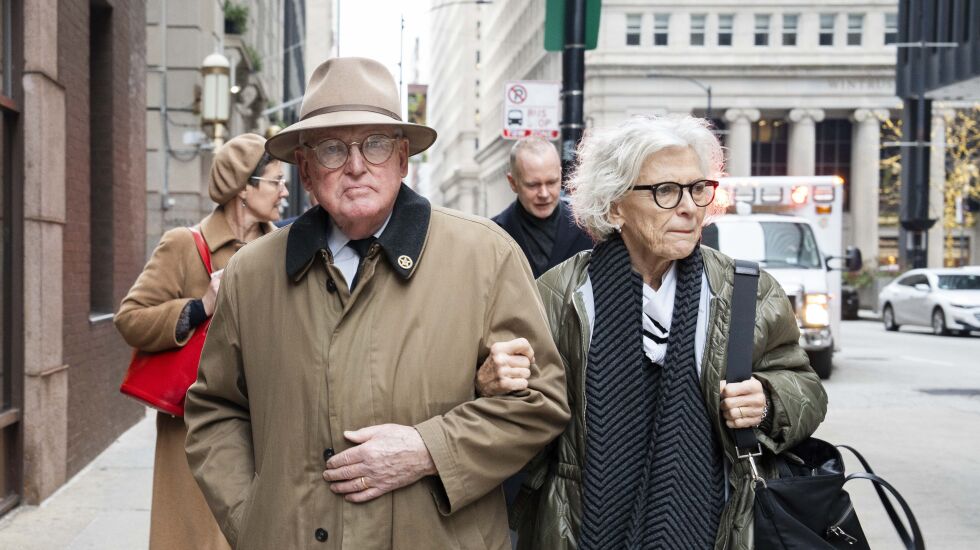
It wasn’t unusual for former Ald. Edward M. Burke to give an impromptu lesson on Chicago’s past and its colorful characters during his more than half-century at City Hall.
Burke, who sat on the City Council for 54 years, was never going to be relegated to the footnotes of Chicago history. He controlled which Cook County judges would be slated, ran the City Council’s powerful Finance Committee and, as a private lawyer, catered to wealthy interests seeking big cuts in their property taxes — including, at one point, companies owned by Donald Trump.
All of that made his name synonymous with power and influence for far too long for Burke to ever be a footnote in Chicago political history. For much of his career, he was considered by many to be the most powerful alderman on the council.
But with a federal jury’s guilty verdict on racketeering charges and other counts on Thursday, the former 14th Ward alderman earned another title: convicted felon. He became yet another corrupt politician in a long, sorry line of at least 38 other council members who have been convicted since 1972.
This is not a record to make the city proud.
Chicagoans, and other Illinoisans, have grown accustomed to crooked politicians, perhaps even blasé. But it was, we hope, a monumental step toward reform when a jury of nine women and three men found Burke guilty on 13 of 14 counts of racketeering conspiracy, bribery and extortion. One of Burke’s co-defendants, his political aide, Peter Andrews, was found not guilty; the other, developer Charles Cui, was convicted. Jurors heard from 38 witnesses over 16 days.
Some of Burke’s former colleagues called his conviction “sad,” a tragic end to an otherwise “remarkable” career. Still fond of Burke, and contemptuous of former Ald. Danny Solis for his role as the FBI mole who was key to Burke’s fall, they insisted that Burke helped more people than he hurt.
But Chicagoans have every right to feel relief, not sadness, at Burke’s conviction, along with a sense of hope that it will help move the city closer to finally shedding its image as a bastion of corruption. This was a conviction not only of Burke, but of the old “Chicago way” of trading favors for political gain.
The job is far from finished. It won’t be completed until all of us who love this city can be assured that critical decisions that impact our lives are no longer made before the altar of quid pro quo.
To that end, investigators and watchdogs must keep digging. Voters must insist on candidates free of the taint of secret dealings and scandal. Public officials and officeholders must put the best interests of Chicagoans first, before their own gain.
Trappings of power
Burke was convicted of using his seat on the City Council to steer business to his private law firm, in schemes that involved the massive Old Post Office, a Burger King near 41st Street and Pulaski Road, and a Binny’s Beverage Depot on the Northwest Side. He also was accused of threatening to block an admission fee increase at the Field Museum because its employees did not respond when he tried to land an internship for the daughter — described in court at Burke’s goddaughter — of former Ald. Terry Gabinski.
Burke’s lawyers said the case was nothing but “a lot of noise and confusion,” and lambasted prosecutors for not calling Solis, who wore a wire for years and recorded key conversations with Burke, to testify. Instead, it was Burke’s lawyers who summoned Solis to the witness stand.
Solis also wore a wire against former Illinois House Speaker Michael Madigan, who faces trial on federal corruption charges in April.
The Sun-Times unmasked Solis, the former alderman of the 25th Ward, as an FBI mole in January 2019. Solis had agreed to wire up and help the feds after FBI agents showed up at his door in June 2016, confronting him with evidence of his own alleged wrongdoing. Solis left office in 2019.
As for Burke, it’s a sign of his former staying power that he won reelection in February 2019, despite having been indicted by federal prosecutors a month earlier on the attempted extortion charges. Before that, on Nov. 29, 2018, the FBI had sent shockwaves through Chicago by raiding Burke’s City Hall and ward offices.
A grand jury handed up the broader racketeering indictment against Burke in May 2019. But it wasn’t until a few months ago, in May, that Burke finally left office.
It took years for the wheels of justice to turn in this case. The whispers — and news reports — about Burke’s power and alleged corruption stretch back years.
Kudos to the 12 jurors who said “No more.” Chicago is better off for it.
The Sun-Times welcomes letters to the editor and op-eds. See our guidelines.







